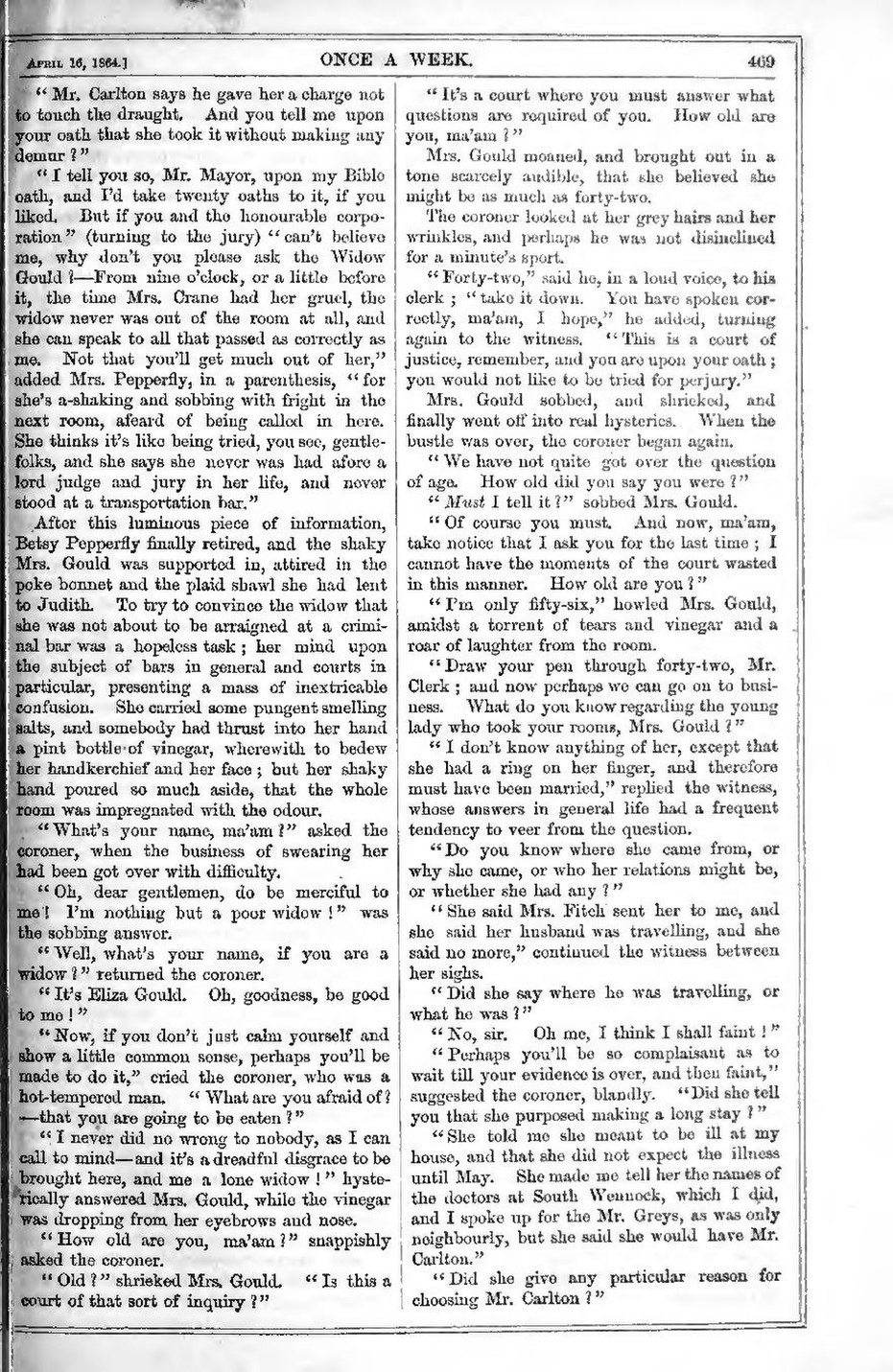“Mr. Carlton says he gave her a charge not to touch the draught. And you tell me upon your oath that she took it without making any demur?”
“I tell you so, Mr. Mayor, upon my Bible oath, and I’d take twenty oaths to it, if you liked. But if you and the honourable corporation” (turning to the jury) “can’t believe me, why don’t you please ask the Widow Gould?—From nine o’clock, or a little before it, the time Mrs. Crane had her gruel, the widow never was out of the room at all, and she can speak to all that passed as correctly as me. Not that you’ll get much out of her,” added Mrs. Pepperfly, in a parenthesis, “for she’s a-shaking and sobbing with fright in the next room, afeard of being called in here. She thinks it’s like being tried, you see, gentlefolks, and she says she never was had afore a lord judge and jury in her life, and never stood at a transportation bar.”
After this luminous piece of information, Betsy Pepperfly finally retired, and the shaky Mrs. Gould was supported in, attired in the poke bonnet and the plaid shawl she had lent to Judith. To try to convince the widow that she was not about to be arraigned at a criminal bar was a hopeless task; her mind upon the subject of bars in general and courts in particular, presenting a mass of inextricable confusion. She carried some pungent smelling salts, and somebody had thrust into her hand a pint bottle of vinegar, wherewith to bedew her handkerchief and her face; but her shaky hand poured so much aside, that the whole room was impregnated with the odour.
“What’s your name, ma'am?” asked the coroner, when the business of swearing her had been got over with difficulty.
“Oh, dear gentlemen, do be merciful to me! I’m nothing but a poor widow!” was the sobbing answer.
“Well, what’s your name, if you are a widow?” returned the coroner.
“It’s Eliza Gould. Oh, goodness, be good to me!”
“Now, if you don’t just calm yourself and show a little common sense, perhaps you’ll be made to do it,” cried the coroner, who was a hot-tempered man. “What are you afraid of?—that you are going to be eaten?”
“I never did no wrong to nobody, as I can call to mind—and it’s a dreadful disgrace to be brought here, and me a lone widow!” hysterically answered Mrs. Gould, while the vinegar was dropping from her eyebrows and nose.
“How old are you, ma'am?” snappishly asked the coroner.
“Old?” shrieked Mrs. Gould. “Is this a court of that sort of inquiry?”
“It’s a court where you must answer what questions are required of you. How old are you, ma'am?”
Mrs. Gould moaned, and brought out in a tone scarcely audible, that she believed she might be as much as forty-two.
The coroner looked at her grey hairs and her wrinkles, and perhaps he was not disinclined for a minute’s sport.
“Forty-two,” said he, in a loud voice, to his clerk; “take it down. You have spoken correctly, ma'am, I hope,” he added, turning again to the witness, “This is a court of justice, remember, and you are upon your oath; you would not like to be tried for perjury.”
Mrs. Gould sobbed, and shrieked, and finally went off into real hysterics. When the bustle was over, the coroner began again.
“We have not quite got over the question of age. How old did you say you were?”
"Must I tell it?” sobbed Mrs. Gould.
“Of course you must, And now, ma'am, take notice that I ask you for the last time; I cannot have the moments of the court wasted in this manner. How old are you?”
“I’m only fifty-six,” howled Mrs. Gould, amidst a torrent of tears and vinegar and a roar of laughter from the room.
“Draw your pen through forty-two, Mr. Clerk; and now perhaps we can go on to business. What do you know regarding the young lady who took your rooms, Mrs. Gould?”
“I don’t know anything of her, except that she had a ring on her finger, and therefore must have been married,” replied the witness, whose answers in general life had a frequent tendency to veer from the question.
“Do you know where she came from, or why she came, or who her relations might be, or whether she had any?”
“She said Mrs. Fitch sent her to me, and she said her husband was travelling, and she said no more,” continued the witness between her sighs.
“Did she say where he was travelling, or what he was?”
“No, sir, Oh me, I think I shall faint!”
“Perhaps you’ll be so complaisant as to wait till your evidence is over, and then faint,” suggested the coroner, blandly. “Did she tell you that she purposed making a long stay?”
“She told me she meant to be ill at my house, and that she did not expect the illness until May. She made me tell her the names of the doctors at South Wennock, which I did, and I spoke up for the Mr. Greys, as was only neighbourly, but she said she would have Mr. Carlton.”
“Did she give any particular reason for choosing Mr. Carlton?”
